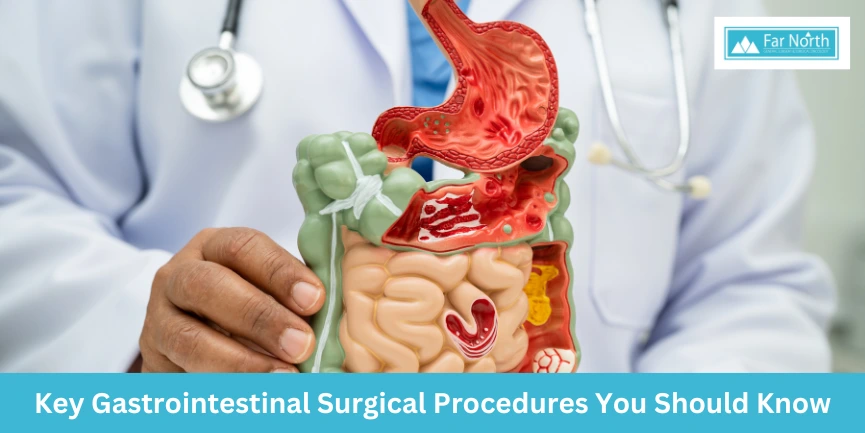


Digestive discomfort isn’t just inconvenient, it can interfere with your daily life and overall well-being. When lifestyle changes and medications aren’t enough, gastrointestinal (GI) surgery may become a necessary step. With advancements in medical technology, many GI surgeries are now more effective and less invasive than ever before.
In this blog, we’ll break down the most common GI surgeries to give you a clear understanding of what each procedure entails.
Gastrointestinal surgery encompasses any operation performed on the digestive tract, including the esophagus, stomach, intestines, colon, liver, gallbladder, and pancreas. These procedures are often necessary to treat a wide range of conditions, from benign concerns like hernias to more serious diseases like colorectal cancer or Crohn’s disease.
GI tract surgery may be life-saving, especially in cases of cancer or severe digestive disorders. It often provides symptom relief, improves quality of life, and, in some cases, offers a permanent cure.
Here’s an overview of some of the most commonly performed GI surgical procedures:
Colorectal surgery involves the removal or repair of parts of the colon and rectum. It is commonly performed to treat:
Advancements in laparoscopic (minimally invasive) techniques have made these surgeries less painful with quicker recovery times. Post-surgery, patients often need dietary adjustments and ongoing monitoring to maintain bowel health.
Gastrectomy is the surgical removal of part or all of the stomach. It is indicated for conditions such as:
While gastrectomy can be life-saving or transformative, it requires patients to adapt their eating habits significantly. Risks include nutrient deficiencies, but the benefits often outweigh the challenges.
This procedure involves removing the gallbladder, most often due to:
Laparoscopic cholecystectomy is now the standard, involving small incisions and shorter hospital stays. After surgery, most patients resume normal diets quickly, though some may need to avoid fatty foods initially.
Bariatric surgeries assist with significant weight loss and include:
These procedures not only reduce stomach size but can also improve metabolic conditions like type 2 diabetes. While effective, bariatric surgery requires careful patient selection and lifelong lifestyle changes to maintain results and avoid complications.
Hernias occur when an organ or tissue pushes through a weak spot in the abdominal wall. Common types include:
Surgery, either laparoscopic or open, repairs the defect. Recovery focuses on gradually resuming activities while avoiding strain to prevent recurrence.
Gastrointestinal (GI) surgery can play a vital role in treating a range of digestive conditions. For many patients, it offers relief from chronic symptoms, restores normal function, and can significantly enhance quality of life. In more serious cases, it may be essential for life-saving treatment.
However, like all surgical procedures, GI surgeries come with certain risks, including:
Comprehensive pre-surgical evaluations, including imaging, lab tests, and specialist consultations, are crucial for minimizing risks and ensuring the safest most effective treatment plan.
Recovery times vary by procedure but commonly include:
Patients may need to follow a specific diet, take supplements, or modify their lifestyle to support recovery and prevent complications.
If you are experiencing persistent digestive problems, unexplained weight loss, or have been diagnosed with a GI condition, it may be time to consult a specialist.
Signs to Watch For:
Medications, dietary changes, and physical therapy may offer relief, but when these fail, surgery may be the most effective solution.
Age, general health, severity of the condition, and overall prognosis all play a role in determining if surgery is appropriate.
From managing chronic diseases to removing life-threatening tumors, gastrointestinal surgery plays a crucial role in modern healthcare. Whether it's a minimally invasive cholecystectomy or a complex colorectal resection, understanding your options empowers you to make better health decisions.
Always consult a qualified GI surgeon to explore the best course of action for your condition.
When it comes to your digestive health, you deserve clarity, confidence, and care that truly makes a difference. Far North Surgery is here to deliver just that. With proven expertise and personalized treatment plans, we help you move forward with peace of mind.
Reach out today and start your healing journey.